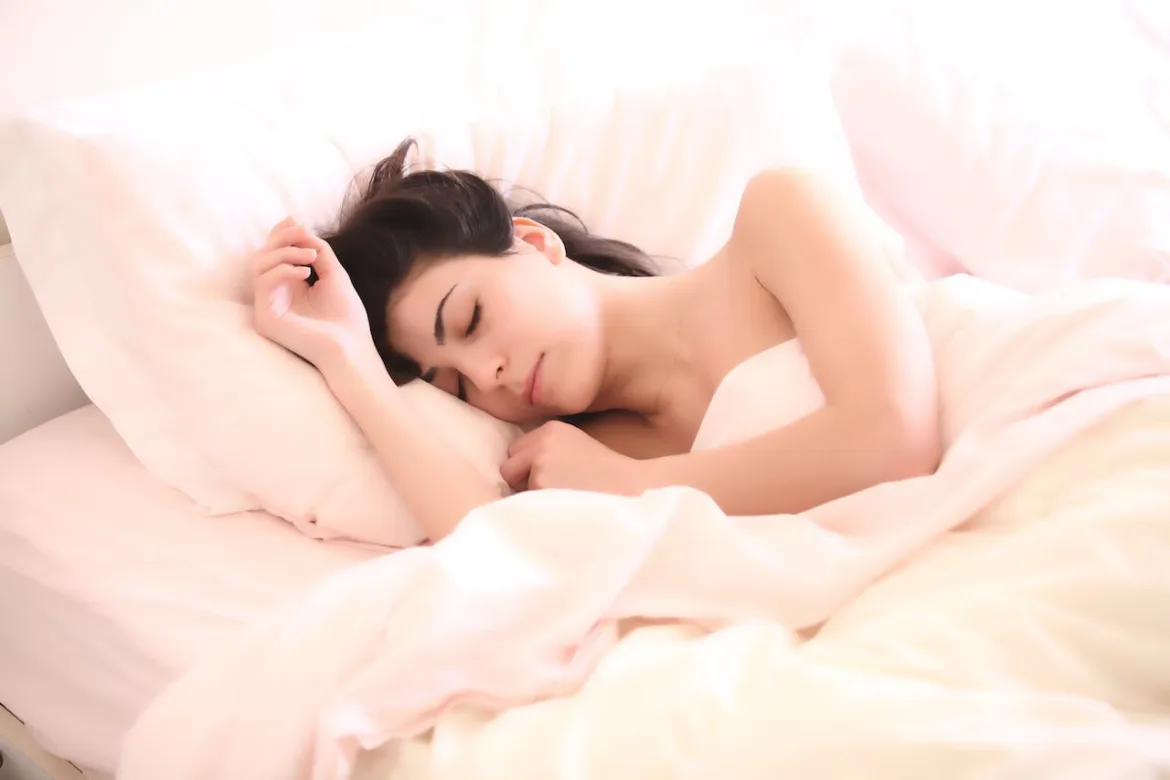Table of Contents
Introduction

Do you regularly struggle to get a good night’s sleep? If so, you’re not alone. Approximately 50-70 million US adults have a sleep disorder, while many more fail to get the recommended 7-9 hours of shut-eye needed for optimal health, well-being and performance.
Chronic sleep deprivation is associated with decreased productivity, impaired cognitive function, mood disturbances, weight gain and a higher risk of accidents or injury. On the bright side, making a few simple tweaks to your daily routine can dramatically improve your ability to fall asleep faster and sleep more soundly through the night.
In this complete guide, we’ll walk through the root causes of insufficient or low-quality sleep along with actionable steps anyone can take to consistently get enough high-quality zzz’s.
Are You Getting Enough Sleep?
What Constitutes “Enough Sleep?”

Before diving into causes and solutions, let’s define what constitutes “enough” sleep. The National Sleep Foundation offers the following daily sleep time recommendations based on age group:
- Newborns (0-3 months): 14-17 hours
- Infants (4-11 months): 12-15 hours
- Toddlers (1-2 years): 11-14 hours
- Preschoolers (3-5): 10-13 hours
- School-age children (6-13): 9-11 hours
- Teenagers (14-17): 8-10 hours
- Younger adults (18-25): 7-9 hours
- Adults (26-64): 7-9 hours
- Older adults (65+): 7-8 hours
As you can see, 7-9 hours per night is broadly recommended for most adults, whereas teens and younger children need even more sleep to fuel growth and development.
Now that you know how much sleep you should aim for, let’s explore some of the most common hurdles that prevent people from hitting these targets. Gaining insight into what’s disrupting your sleep makes it easier to identify and implement appropriate solutions.
Top Causes of Insufficient Sleep
There are many factors that can stand between you and high-quality sleep. Here are some of the most prevalent culprits along with tips for troubleshooting them:
Poor Sleep Hygiene

Sleep hygiene refers to your daily routines and sleep-related behaviours that impact your ability to fall asleep and stay asleep. Examples of suboptimal sleep hygiene include:
- Irregular Sleep Schedules: Going to bed and waking up at inconsistent times night-to-night makes it difficult for your body to enter restorative sleep cycles. Aim for the same bedtime/wake time 7 days a week.
- Daytime Napping: While short power naps can enhance alertness and performance, longer or late-day naps contribute to insomnia symptoms. Limit naps to 30 minutes before 3 pm.
- Exposure to Blue Light Before Bed: Light-emitting devices like cell phones, laptops, tablets and TVs emit blue light that suppresses melatonin and keeps your brain wired at night. Avoid screens for 1-2 hours before bedtime.
- Uncomfortable Sleep Environment: An uncomfortable mattress or pillow, irregular room temperature or excessive noise can ruin sleep quality. Optimize your bedroom for sleeping with comfortable bedding, blackout curtains, a fan/white noise machine and a temperature set between 60-75° Fahrenheit.
Following healthy sleep hygiene habits makes it more likely that you’ll fall asleep quickly and sleep soundly through the night.
Stress, Anxiety and Rumination

When your mind is racing with anxious or obsessive thoughts at night, it becomes nearly impossible to unwind. The body cannot enter deeper NREM and REM sleep stages when physiological arousal is elevated.
If you struggle with stress, anxiety or excessive rumination at bedtime:
- Practice relaxation techniques like deep breathing, progressive muscle relaxation, meditation or guided imagery for 10-20 minutes before getting in bed. These elicit the “relaxation response” to reduce blood pressure, heart rate and muscular tension that inhibits sleep.
- Offload worries, to-do lists or repetitive thoughts by journaling at night. Transferring thoughts from your head onto paper brings a sense of resolution that makes it easier to quiet your mind.
- Notice negative thought patterns without judgment using CBT-based approaches like cognitive defusion. Remind yourself that you can revisit circular thoughts in the morning – they’ll still be there, but catching some zzz’s must come first.
Disruptive Sleep Disorders

Many sleep disorders like insomnia, sleep apnea and restless leg syndrome directly interfere with the quality and quantity of shuteye people get. Tell-tale signs you may have an underlying sleep condition include:
- Taking 30+ minutes to fall asleep most nights
- Waking up repeatedly or too early
- Loud snoring, breathing interruptions or leg twitching through the night
- Feeling exhausted upon waking, even after ample time spent sleeping
Sleep disorders often worsen without treatment. Visiting a doctor or sleep specialist can help diagnose and address root causes for markedly improved nightly rest. Lifestyle changes also complement medical sleep disorder management.
Poor Stress Management During the Day

When daily stress is managed inadequately, sleep often suffers as a result. The anxiety, worry and hypervigilance activated by stressful events or situations often persist into the evening – impeding your ability to downshift into rest.
Proactively managing daily stress with healthy coping strategies prevents this residual arousal from sabotaging sleep:
- Take regular breaks during work to reset your mental focus
- Bookend busy days with relaxation practices
- Maintain work-life boundaries via email/notification management
- Exercise to metabolise the stress hormone cortisol
- Keep a manageable to-do list and workload
- Set aside dedicated low-stress time for self-care
Think preventatively when it comes to managing daily stress so it doesn’t spill into sleep time.
Poor Sleep Efficiency

Sleep efficiency refers to the percentage of time you spend asleep after getting into bed. The average adult sleep efficiency is around 85%. In other words, a standard 8-hour sleep opportunity with 85% efficiency equates to roughly 6 hours and 40 minutes of actual sleep.
Low sleep efficiency is characterised by:
- Difficulty falling asleep despite getting in bed early enough
- Tossing and turning or waking up sporadically overnight
- Waking too early without being able to fall back asleep
When sleep efficiency drops to 70% or below, sleep debt accumulates. Luckily, the actionable tips throughout this guide enhance sleep efficiency so you maximise slumber during your allotted sleep window.
How to Get MORE Sleep: Our Top Tips

Now that you understand what’s delaying, disrupting or decreasing sleep quantity, let’s talk about solutions. Here are our top evidence-based recommendations for getting enough nightly Zzz’s:
Optimise Sleep Hygiene
As discussed above, adhering to proper sleep hygiene is essential for ample, high-quality sleep. To recap, be sure to:
- Maintain a regular sleep-wake schedule 7 days a week
- Avoid long naps, especially in the late afternoon or evening
- Power down light emitting electronics 1-2 hours pre-bed
- Create an optimal sleep environment – cool, dark, quiet and cosy!
Double Down on Stress Management
When daily stress seeps into bedtime, falling and staying asleep becomes extremely difficult. Use the above recommendations to improve stress regulation across the 24 hour period:
- Exercise, meditation and relaxation response habits
- Boundary setting around work and responsibilities
- Designating ample daily downtime
Rule Out Any Sleep Disorders

Unaddressed sleep disorders like insomnia, sleep apnea and restless leg syndrome are dealbreakers when it comes to getting enough sleep. Getting checked out by a sleep specialist can identify issues along with tailored treatment plans.
Reset Internal Clock with Bright Light Therapy
Exposure to bright light during strategic times of day helps synchronise the body’s internal 24-hour “circadian” clock. When circadian rhythms are aligned, melatonin turns on as it should in the evening while cortisol spikes upon waking to start the day.
To leverage light as a sleep booster, be sure to:
- Get ample natural light exposure first thing in the morning
- Avoid bright indoor lights after sundown
- If needed, use a bright light therapy device for 30-60 minutes upon waking
*Bright light therapy is especially helpful for shift workers or jet lag recovery.
Ensure You Get Enough Magnesium & Iron

Mineral deficiencies impair your body’s ability to produce and utilize melatonin for sleep signalling. Magnesium and iron specifically must be consumed through foods or supplements at adequate levels.
Increase magnesium & iron intake by:
- Eating magnesium-rich foods like spinach, pumpkin seeds, yoghurt and bananas
- Consuming iron via grass-fed beef, lentils, spinach and cashews
- Taking 200-400 mg magnesium and/or 75 mg iron before bed if deficient
*Always check with your doctor before supplementing to prevent excess intake.
Limit Liquid Intake Before Bed

Drinking too many fluids close to bed forces the middle of the night waking to urinate. This sleep interruption makes it challenging to settle back into deep restorative sleep.
Cut down on late-day liquids by:
- Restricting fluid intake 1-2 hours before bedtime
- Avoiding alcohol and caffeine overnight – both act as diuretics
Consider Melatonin Supplementation
Melatonin is a naturally occurring sleep-signaling hormone released around 9 pm to induce drowsiness. When melatonin rhythms are disrupted or levels low, supplemental melatonin 30-60 minutes before bed helps reestablish healthy sleep-wake cycles.
*Melatonin should not be taken long-term but used as an occasional sleep aid
Ask Your Doctor About Prescription Options
If you have chronic unrestful sleep or an underlying sleep disorder, prescription medications may help when taken correctly under medical guidance. Talk to your doctor about whether options like:
- Sedative hypnotics for insomnia symptoms
- GABA medications for anxiety or nerve pain
- Circadian regulators to stabilize sleep-wake rhythms could benefit your sleep.
The Takeaway

Quality, ample sleep is crucial for health, mood, safety, performance and longevity. By understanding the multifaceted issues that sabotage sleep coupled with targeted solutions, consistently getting 7-9 hours per night is within reach!
Start by identifying your personal sleep disruptors among the issues outlined here – stress, medical conditions, environment, behaviours etc. Then deploy the evidence-backed tips to improve sleep quantity and efficiency.
Stick with these strategies for 3-4 weeks to cement improved sleep habits. Sweet dreams!

FAQs
How many hours of sleep do adults need for optimal health?
The National Sleep Foundation recommends 7-9 hours of sleep per night for adults ages 26-64. Getting less than 7 hours regularly can lead to sleep deprivation and associated health issues over time.
What’s the best way to ensure I maintain a consistent sleep schedule?
Go to bed and wake up at the same time each day, even on weekends and days off. Consistency between days helps regulate your body’s internal clock for better sleep quality long-term.
Why should I avoid looking at screens before bedtime?
Screens like cell phones, tablets and laptops emit blue light that suppresses melatonin production and keeps your brain alert when you’re trying to wind down. Avoid them 1-2 hours before bed for easier falling asleep.
What temperature should I keep in my bedroom to optimise sleep?
Experts recommend a bedroom temperature between 60-75° Fahrenheit. Temperatures above or below this range can disrupt sleep. Assess your comfort – then adjust the thermostat or bedding accordingly.
What should I do if healthy sleep habits aren’t working for me?
If you’ve rigorously practised good sleep hygiene for 3-4 weeks but still struggle with sleep quality or quantity, speak to your doctor. An underlying sleep disorder could be at play and may require further evaluation or medical treatment to address.



